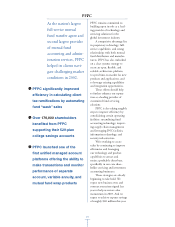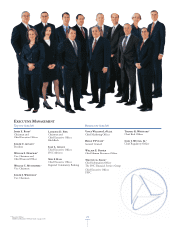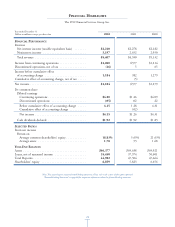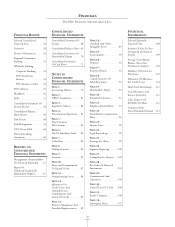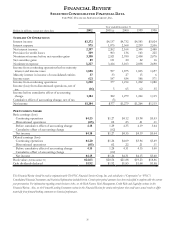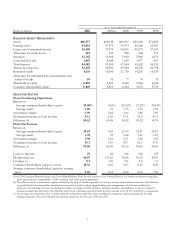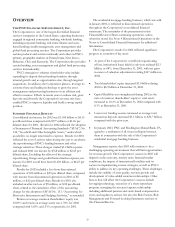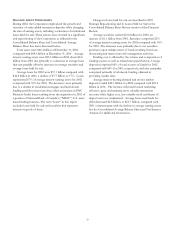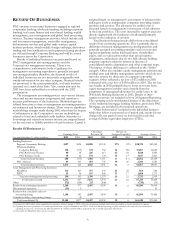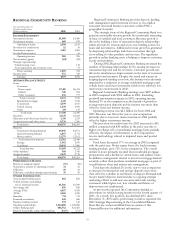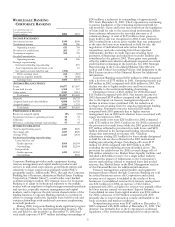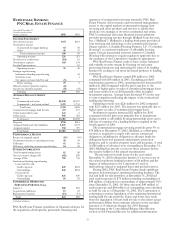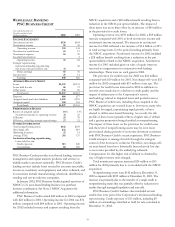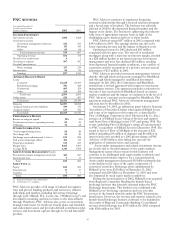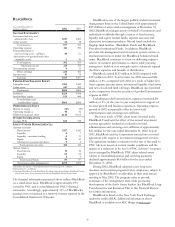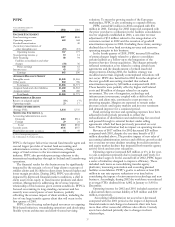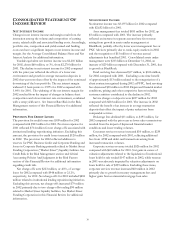PNC Bank 2002 Annual Report Download - page 30
Download and view the complete annual report
Please find page 30 of the 2002 PNC Bank annual report below. You can navigate through the pages in the report by either clicking on the pages listed below, or by using the keyword search tool below to find specific information within the annual report.28
OVERVIEW
THE PNC FINANCIAL SERVICES GROUP, INC.
The Corporation is one of the largest diversified financial
services companies in the United States, operating businesses
engaged in regional community banking; wholesale banking,
including corporate banking, real estate finance and asset-
based lending; wealth management; asset management and
global fund processing services. The Corporation provides
certain products and services nationally and others in PNC’s
primary geographic markets in Pennsylvania, New Jersey,
Delaware, Ohio and Kentucky. The Corporation also provides
certain banking, asset management and global fund processing
services internationally.
PNC’s strategies to enhance shareholder value include
expanding its deposit-driven banking franchise through
internal growth and, as opportunities arise, through targeted
acquisitions. In addition, the Corporation plans to leverage its
customer base and leading technology to grow the asset
management and processing businesses in an efficient and
effective manner. Efforts in recent years to reduce risk, grow
deposits and diversify the Corporation’s revenue mix have
enabled PNC to improve liquidity and build a strong capital
position.
SUMMARY FINANCIAL RESULTS
Consolidated net income for 2002 was $1.184 billion or $4.15
per diluted share compared with $377 million or $1.26 per
diluted share for 2001. Results for 2002 reflected the adoption
of Statement of Financial Accounting Standards (“SFAS”) No.
142, “Goodwill and Other Intangible Assets,” under which
goodwill is no longer amortized to expense. Results for 2001
reflected the cost of actions taken during the year to accelerate
the repositioning of PNC’s lending business and other
strategic initiatives. These charges totaled $1.2 billion pretax
and reduced 2001 net income by $768 million or $2.65 per
diluted share. Excluding the effects of the strategic
repositioning charges and goodwill amortization expense, net
income for 2001 would have been $1.238 billion, or $4.23 per
diluted share.
Results for 2002 included a loss from discontinued
operations of $16 million, or $.05 per diluted share, compared
with income from discontinued operations in 2001 of $5
million, or $.02 per diluted share. Results for 2001 also
included an after-tax loss of $5 million, or $.02 per diluted
share, related to the cumulative effect of the accounting
change for the adoption of SFAS No. 133, “Accounting for
Derivative Instruments and Hedging Activities,” as amended.
Return on average common shareholders’ equity was
18.83% and return on average assets was 1.78% for 2002
compared with 5.65% and .53%, respectively, for 2001.
The residential mortgage banking business, which was sold
in January 2001, is reflected in discontinued operations
throughout the Corporation’s consolidated financial
statements. The remainder of the presentation in this
Financial Review reflects continuing operations, unless
otherwise noted. See Note 4 Discontinued Operations in the
Notes to Consolidated Financial Statements for additional
information.
The Corporation’s results for 2002 reflected significant
progress in a number of key areas:
• As part of the Corporation’s overall risk repositioning
efforts, institutional loans held for sale were reduced $2.3
billion, or 88%, from December 31, 2001, with net gains
in excess of valuation adjustments totaling $147 million in
2002.
• Total shareholders’ equity increased $1.0 billion during
2002 to $6.9 billion at December 31, 2002.
• Capital flexibility was strengthened during 2002 as the
ratio of common shareholders’ equity to total assets
increased to 10.3% at December 31, 2002 compared with
8.3% at December 31, 2001.
• Lower cost funding sources increased as average total
transaction deposits increased $1.1 billion, to $30.7 billion,
compared with the prior year.
• In January 2003, PNC and Washington Mutual Bank, FA,
agreed to a settlement of all issues in dispute between
them in connection with the sale of the Corporation’s
residential mortgage banking business.
Management expects that 2003 will continue to be a
challenging operating environment that will limit opportunities
for revenue growth. The Corporation’s success in 2003 will
depend on the economy, interest rates, financial market
conditions, the impact of international hostilities and its
success in implementing current strategies, as well as PNC’s
ability to address its key operating challenges. These challenges
include the stability of asset quality, revenue growth and
development of value-added customer relationships. Other
factors that will affect the Corporation’s success include
leveraging technology, execution of a share repurchase
program, managing the revenue/expense relationship
including additional pension and stock-based compensation
costs, and regulatory actions. See also the Risk Factors, Risk
Management and Forward-Looking Statements sections of
this Financial Review.



